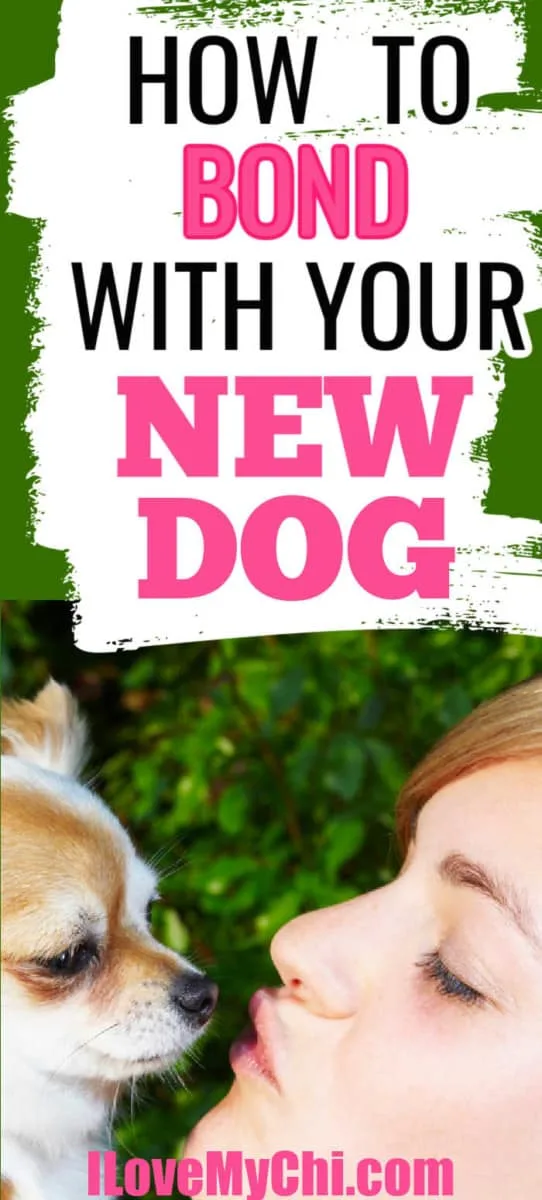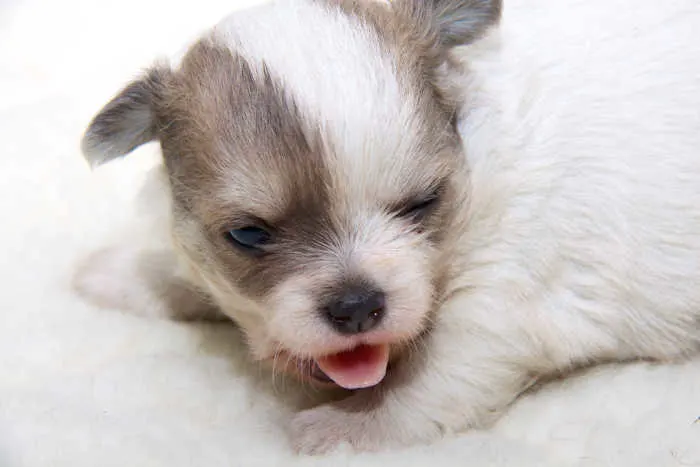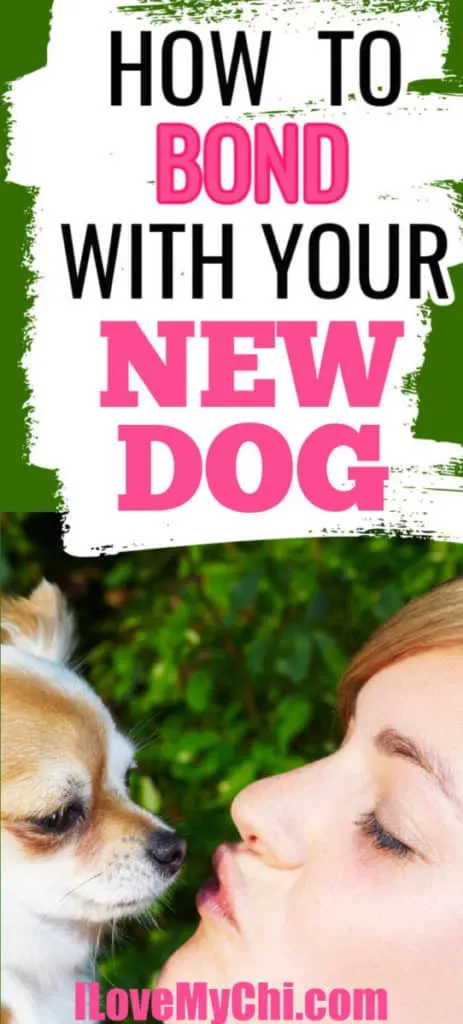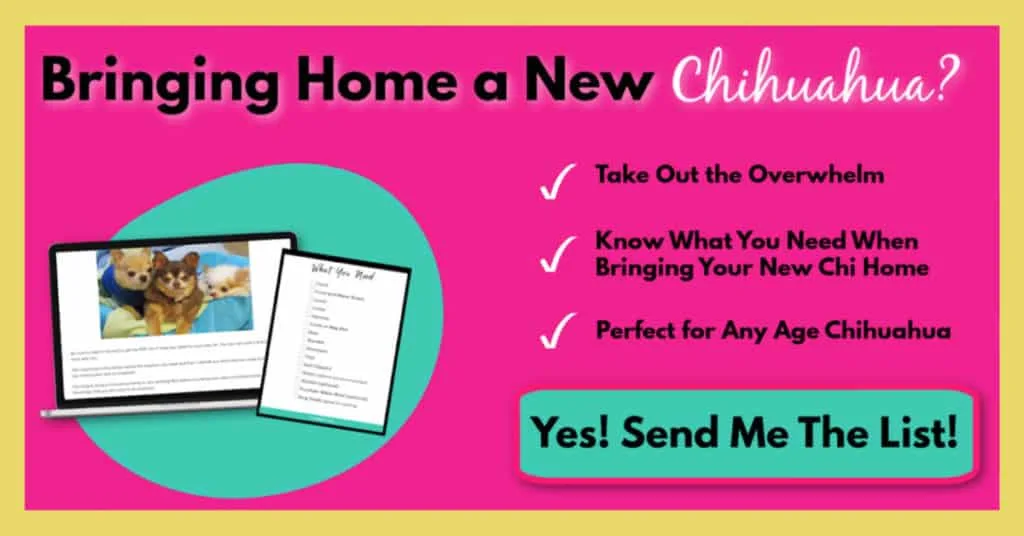
If you have never had a puppy or dog before, you might not know where to start. The good news is that bonding with them is much more simple than you might think! Let’s discuss:
What should I do when I first bring my new puppy or dog home?
What happens in the first day will be dependent upon the age and background of your new furry friend:
Puppy’s First Day

The absolute first thing that must happen is the puppy must go potty before they go into the house.
If they do not potty promptly, walk them around your yard or up and down the street until they do.
The goal of this first potty break is simply to empty their bladder; you will want their bladder empty as they explore the house. Subsequent potty trips can be more focused on where you want your new dog to get in the habit of going to relieve themselves.
The first week, you should take your puppy to potty hourly while you are home to help them with becoming house trained.
If you want to use pee pads, ensure that they constantly have access to the pads, and place some of their waste on the pee pad to encourage them to begin using it.
Either way, make sure your puppy gets more than enough praise when they do what they are supposed to do to help them understand what you want.
Once your puppy’s bladder is empty, walk around your house and yard with them so they can see their new home.
Be sure to use a leash when outside if you do not have a secure fence.
Show your puppy the toys you purchased for him or her, and if they initiate play, play with them.
Give them some water to drink, then be sure to take the puppy to potty after their drink to help with house training.
Offer the first meal around the time that you plan on offering breakfast or dinner each day.
As the first day is usually a big transition, if you choose to offer treats, offer something bland like a dog biscuit rather than something rich and meaty in case their tummy is upset.
Your puppy will be tired; after all, he or she had a busy day! Be sure to have a cozy bed ready for their first nap. Stay in the room with them while they nap, and pet them as they fall asleep. Try to be with them when they wake up because they might need to potty as soon as they wake up.
Whatever time you have before bedtime will be quality get to know you time. Just hang out with your puppy, and put your cell phone to the side to focus your attention on your puppy. Keep it low key.
If you will be crate training, when it’s bedtime, take the puppy to potty one more time then say “kennel up” and throw a bland biscuit into the crate. Place the crate where you will want it to be long term.
Keep your self restraint strong because if the puppy is alone he or she will protest this grand injustice. If you give in on the first night, your puppy will probably sleep in your bed every night thereafter.
Be sure there’s a soft bed in the crate and a blankie to keep them snuggly and warm. A stuffed toy may help too.
Rescue Dog’s First Day

Keep in mind that rescued dogs need about two weeks of time to decompress. The first day especially, and the first two weeks, should be quiet.
If you have a tribe who is excited for your new dog to be welcomed into your family, as tempting as it would be to have them all waiting at your house to welcome the dog home, the dog would likely be overwhelmed by such a large gathering occurring on their first day.
For a dog who must decompress from being in a shelter, no visitors should come to the house for the first week. The second week one or two guests could come for a low key visit.
If more than two want to visit, going to a park to walk together is recommended.
For a dog who was previously in a foster home, the transition will be a little smoother because they are used to living in a house as part of a family.
Similarly to the puppy’s first day, make sure you empty your dog’s bladder before going inside, and offer them a tour of their new home inside and out.
Always use a leash when outside in an area that is not securely fenced. This should always be done for general safety, but it is crucial when a dog first comes home because they will not be familiar with the area making it easy for them to be lost.
Once inside, offer water, and show the dog where their kennel, bed, and toys are.
Follow their lead on if they would like to play or relax. When they are ready to relax, sit on the couch or the floor and read a book or watch tv, allowing them the opportunity to sit with you, relax and be petted.
Serve the first meal around the time of day that your dog will usually eat.
If you have background information on the dog that you are rescuing, use it to help them feel more comfortable at your house. If you do not have any information about your new dog’s background, be very observant to learn what makes them fearful so that you can help them learn life is not scary.
The first few weeks will be an adjustment for both of you. Living in a kennel environment is not ideal for a dog, so your shelter pup might be struggling to adjust. Be patient, loving and kind. Remember that your furry friend might be learning that not all humans are mean, and behaviors that might be less than ideal could be resulting from fear or anxiety. Do not hesitate to enlist the assistance of a dog trainer if needed.
Bonding Activities
Once the first day is behind you, the next phase is bonding and getting to know each other’s personalities and quirks. Here is a list of activities to do to bond with your puppy or dog:
Petting and Snuggling. Petting dogs is like giving them a massage and they love the attention. Most puppies and dogs love to snuggle, but not all, so consider your pet’s personality first.
Most Chihuahuas love to wrapped in a blanket like a burrito and sitting in their owner’s laps. Dogs of any size are attracted to a nest of blankies and the promise of being petted.
You can talk to them or read to them while you pet and snuggle them; most dogs love hearing their people talk to them and find it soothing.
Go for walkies. No matter the size of your dog, daily walks are important to their physical and mental health. Dogs love going for walks and consider walking together to be a pack activity which helps with the bonding process.
Physical activity helps them maintain a healthy weight and staying active is healthy for them too. If your dog has tiny legs you do not have to go too far, or you can get a stroller or back pack to carry them when their legs get tired and you want to keep walking.
If you like to run or walk in charity events, you can probably find some to do with your dog; it will offer a bonding activity, a cute photo op, and raise money for a good cause!
Go for a car ride for a pup cup. Many dogs love riding in the car, but not every dog does, so use your judgment regarding your dog’s preferences.
Though your dog does not like car rides; there will be times when they must ride in the car, so getting them used to it is important. The best way to help a dog learn to be okay with car rides is to do short daily rides that always end on a sweet note. Most fast food restaurants offer free cups of water, and many coffee or ice cream establishments offer “pup cups” which are usually cups of whipped cream.
If your dog learns that a car ride ends with a pup cup or going to the park, they are going to learn to enjoy them quickly!
Shadowing. Allow your dog to “shadow you” by taking them with you as many places as possible. With a little creativity, you will find that you can have your dog with you most of the day. This is great for socialization too.
Shopping. Take your dog to go shopping with you. Pet stores are not the only places dogs can shop anymore; inquire with local stores to see if they are dog friendly. Hobby Lobby, Lowes, Home Depot, Cabelas, Home Goods, farmer’s markets and garden centers are often dog friendly.
By taking your dog to different stores, you offer them the opportunity to meet a variety of people which is great for socializing. Just be sure to potty your dog before going inside, prepared to promptly clean up after your pet if they have an accident, and always ask before allowing your dog to approach someone!
Training. Training a dog is an effective way to bond, and it helps a dog learn to be obedient and have good manners. Signing up for a training class is a good way to socialize your puppy or dog, work on training, and find doggy friends to have play dates with.
Grooming. Even if a dog does not enjoy being bathed and brushed, they usually bond with the person who is grooming them because they are being taken care of by that person. And dogs often learn to enjoy a relaxing daily brushing (it helps to keep the shedding under control too).
Sleeping. While many people choose to crate their dogs at night, if dogs could choose, they would choose to sleep in the same bed as their people. Sleeping as a pack in the same bed helps build a bond. If your dog curls up against you, that means that they feel safe and they are comfortable to fall asleep.
Puzzles. Food puzzles are a good way to bond with your dog. By loading up the puzzle and encouraging them to figure it out, you are offering them mental enrichment and bonding with them as they complete the puzzle.
Bonus points: load the puzzle with their meals to make meal time more interesting and to control calories.
Breakfast or dinner dates. Chances are that you have more dog friendly restaurants by your home than you think!
Do a google search for dog friendly restaurants and take your pup to eat on the patio with you.
If you go around their meal time, bring their food so they can eat with you. Most dog friendly restaurants offer water bowls for the puppy patrons and some offer doggy menus too.
Take a class. If you are interested in a doggy activity like agility, herding, treiball, etc, sign up for a class or an initial evaluation to see if your dog would enjoy it.
Doing a class to learn something new is always a good bonding experience.
Remember This When Bonding with a New Dog:
Here are some tips to keep in mind as you bond with your new puppy or dog:
- The first thing you will need to do is establish a routine, and that should begin on the first full day. Dogs like knowing what to expect, even more so if they have had a difficult life.
- A puppy is usually a blank slate in terms of training and habits since they have not been alive very long. Use this opportunity wisely! How you allow your puppy to behave these first few weeks and months will set the tone for the rest of his or her life.
- Bonding does NOT mean allowing your dog to be naughty and wild. If you allow your dog to get away with bad behavior, they will learn that it is okay. A dog should be well trained, and it is totally possible to bond with a dog while holding them to a standard of acceptable behavior.
- Bonding does NOT mean spoiling your dog and letting them rule the roost. A dog who is catered to will become spoiled, and that will result in bad behavior.
- Dogs love to eat, but if you make feeding your dog a bonding experience, they are likely to gain weight. Food does not equal love; helping a dog maintain a healthy weight equals love because it helps them have a healthier, longer life than they would have if allowed to be obese.
Conclusion
Before doing an activity with your dog, consider your dog’s personalty; if they will not enjoy the activity, consider what else you could do together.
While activities can help you bond with your dog, the everyday care and love you show your pet will ultimately be the basis of a strong bond. All puppy owners learn, and all dog owners know, how precious and amazing the bond is once it is established.




Terri
Thursday 15th of July 2021
Hi Cathy,
These are great suggestions!
I recently wrote a similar article on bonding with your dog (https://tailwagwisdom.com/ways-to-bond-with-your-dog/).
I really like your suggestion with taking a new dog shopping, which also helps with socialization. Great idea!
Have you tried massage too bonding? It's a great one for getting to know your dog and improving the dog parent-dog bond.
Keep up the great work!
Terri
margaret l. clickner
Saturday 22nd of August 2020
Good information- thank you.
Cathy
Saturday 22nd of August 2020
You're welcome Margaret!